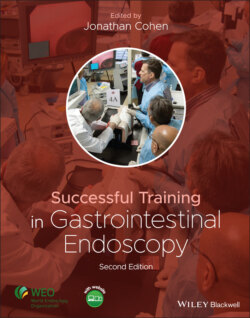Читать книгу Successful Training in Gastrointestinal Endoscopy - Группа авторов - Страница 113
Specific skills
ОглавлениеThe skills required in colonoscopy can be broken down into two main groups: motor and cognitive skills. Traditionally, the focus of many previous colonoscopy‐training chapters published has been almost exclusively on the motor skills. However, the cognitive skills are just as, if not more, important. In this chapter, we will try to address both skill sets.
These two skill groups can be broken down further into “early” and “intermediate” skills as shown in Table 6.1. It is well established in the surgical literature that the most effective method for teaching any technical procedure is to deconstruct the overall procedure down into individual core skills [1]. These skills can then be taught in a stepwise fashion, from the most basic toward the more complex, building on one another. Colonoscopy is no different. These beginning and intermediate skills are simply the skills required to complete routine screening colonoscopy safely and reliably. More advanced endoscopic skills such as complex polypectomy and hemostasis techniques will be covered in other chapters in this text. Depending on how a training program is structured, many trainees will have performed a fair number of EGDs prior to attempting colonoscopy and may have some basic mastery of a few of the early skills such as how to hold a scope correctly and use of the scope controls. Many of the other early skills, however, are specific to lower endoscopy, hence even with some EGD experience, these specific skills will be quite new.
These skills should not be confused with the metrics used to assess competency. Though these skills are an integral part of those metrics, the latter includes additional parameters such as cecal intubation times and success rates, withdrawal times, and polyp detection rates, as well as many others that will be discussed later.
